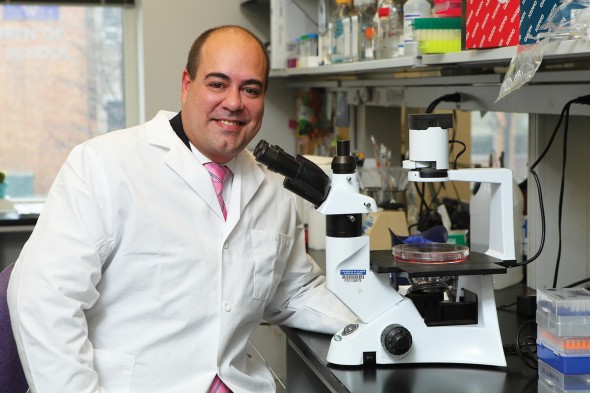Examining the relationships between cells, oxygen

“It’s a tremendous privilege to have the opportunity to discover, reinvent and invent,” says Marcelo Bonini. (Photo: Jenny Fontaine)
Basic Life Sciences
Rising Star
When Marcelo Bonini made the jump from Brazil to the United States for his postdoctoral training at the National Institute of Environmental Health Sciences, he wanted to do science that touched people’s lives.
“I saw a wealth of resources that I could utilize to make translational research more applied research that could eventually improve treatments and clinical care of patients,” he said.
Now the associate professor of medicine, pharmacology and pathology is making discoveries about some of the most prevalent human diseases.
He’s an expert in the field of redox, or reduction-oxidation reactions, biology. He studies how relationships between cells and oxygen shape their behavior and change their health state, focusing on the roles reactive oxygen species (ROS), a byproduct of aerobic respiration in cells, play in biological processes that impact the development of inflamed and cancerous cells.
In the area of cancer biology, Bonini has helped unravel how and why cancer-related metabolic shifts, which promote the growth and spread of tumors, occur. The findings could improve the quality of existing cancer treatment therapies and outcomes.
He’s also uncovered the role of ROS in inflammatory signaling that occurs during sepsis, the immune system’s severe and life-threatening response to infections. Information generated by Bonini’s studies has proven that changes in metabolism can alter the functional phenotypes of macrophages, white blood cells that ingest invading pathogens. A five-year $2.3 million grant from the National Institutes of Health will fund his efforts to engineer macrophages, which he hopes will treat chronic inflammatory diseases.
Provisional patents have been filed or are pending for three of Bonini’s inventions, compounds that will serve as new therapeutics for cancer or inflammation.
“Dr. Bonini has already been highly successful in his research,” wrote Alan Diamond, director of the Division of Pathology Research, pointing to the $2 million in funding Bonini’s labs have received from the National Institutes of Health, the Department of Defense and the American Heart Association. Bonini has published over 70 manuscripts in peer-reviewed journals like Oncotarget and Nature Communications and he is currently an NIH reviewer for the Center for Scientific Review.
“It’s a tremendous privilege to have the opportunity to discover, reinvent and invent, and, by doing that, to touch people’s lives in the most fundamental ways,” Bonini said. “I’m very glad to have this opportunity to educate and be educated by wonderful colleagues and students with whom I learn so much.”
